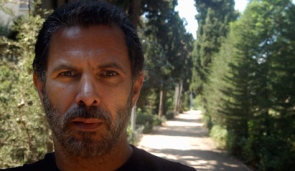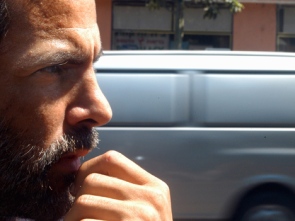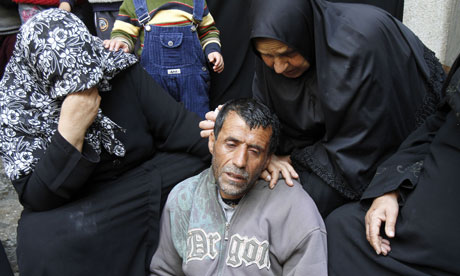EDITOR: Events move fast after Juliano’s murder
This senseless murder (well, is there another type of murder…) has shocked us all who knew and loved him and his work. Theories are flying about who is behind this atrocity and the PA had just arrested someone for the murder. I have heard three main theories about who might be behind it: Extreme Islamists, the Israeli Shin Beth (directly or indirectly, through a collaborator ), and the local settlers. We may find out who it really was in the next few days, or we may not. Mazin Qumsieh has made an important point today: What we should concentrate about is making Juliano a symbol of life together, of democratic and secular Palestine, of the freedom and centrality of art in the life of a nation. It is clear that Juliano was murdered because of his art, becuase of his politics, because of who he was and what he did. We should not forget him, and should not forget his amazing parents, Saliba Khamis and Arna Mer, two pioneers of secular, democratic Palestine!
Palestinians arrest suspect in murder of Israeli actor Juliano Mer-Khamis: Haaretz
PA police arrested and are interrogating former al-Aqsa Martyr Brigades militant who was released from Israeli prison more than five years ago, and is now a suspect in murder of Mer-Khamis.
Palestinian security forces arrested on Tuesday a suspect in the killing of Israeli actor Juliano Mer-Khamis in Jenin on Monday.
According to a security official, Palestinian police have been probing the man – a former al-Aqsa Martyr Brigades militant who was released from Israeli prison more than five years ago – but he has yet to confess to the murder.

Mer-Khamis, 53, an Israeli actor and political activist was shot dead on Monday outside a theater which he founded in a refugee camp in the West Bank city of Jenin.
Jenin police Chief Mohammed Tayyim said Mer-Khamis was shot five times by masked Palestinian militants. Israeli security forces are also investigating the circumstances of his murder.
Mer-Khamis was affiliated with a local theater in Jenin, established by his mother in the 1980s. In 2006, Mer-Khamis opened the Freedom Theater in Jenin, along with Zakariya Zubeidi, the former military leader of the Al-Aqsa Martyr Brigades in the West Bank city.
Zubeidi said in a press conference held at the Freedom Theater on Tuesday that he believed that either a country or organization was behind the murder of his friend.
He said the masked killer seemed to have been trained and that they shot Mer-Khamis in the chest and head seven times.
The Freedom Theater had faced threats before; it was torched twice in the past, and the threats persisted despite Zubeidi’s appointment.
Some of the criticism focused on the fact that the theater offered co-ed activities, despite prohibition in the Islamic moral code.
Gideon Levy remembers Juliano Mer-Khamis: An Arab, a Jew, a human being: Haaretz
Juliano Mer-Khamis was one of the most talented theater actors to ever emerge here was also the most courageous of them.
By Gideon Levy
A little over a month ago, Juliano Mer-Khamis stood on the stage of his Freedom Theater at the edge of the Jenin refugee camp.
Directing his remarks at the young, noisy group of children making its first-ever visit to a theater, he said: “This is a dangerous show, with subversive messages. Whoever talks will be thrown out of the hall.”

A hush came over the audience. For the next 75 minutes, I watched one of the loveliest, most stylish, political plays I had ever seen.
None of the children interrupted the show, with the exception of one infant who burst into tears at the sight of the servant hanging on a rope.
The Freedom Theater presents “Alice in Wonderland,” by Lewis Carroll. Directed by Juliano Mer-Khamis, with Udi Aloni as playwright.
I first saw Mer-Khamis in another time and another place. It was in the late 1980s, when he stood for a number of days in the front yard of the Israel Fringe Theater festival in Acre, his naked body dipped with oil as part of a one-man show that knew no end. Years later I caught “Arna’s Children,” a brilliant film which he co-directed with his dying mother, Arna Mer, the founder of the theatre in Jenin and the daughter of the doctor who cured malaria in Rosh Pina. It is arguably the most moving film ever created about the Israeli occupation.
Since then, I have met him on numerous occasions, always in the camp. This tall, strapping, handsome man who oozed charisma, a Jew and an Arab on account of his parents – perhaps a Jew in the eyes of the Arabs and an Arab in the eyes of the Jews – decided to devote his life to Jenin, where he lived as an Israeli and as a human being. One of the most talented theater actors to ever emerge here was also the most courageous of them.
The seven bullets extinguished the light of courage that he radiated. “Jule was murdered,” a trembling voice belonging to a refugee camp resident on the other end of the phone told me. My voice also trembled.
Goldstone’s Gaza report stands, UN insists: The Guardian
Judge’s informal remarks ‘do not invalidate findings’, says colleague on fact-finding mission into Israeli attack on Gaza
Richard Goldstone on a 2009 visit to a house destroyed during Israel’s offensive in Gaza. Photograph: Ashraf Amra/AP
The UN has roundly rebuffed remarks by the South African judge Richard Goldstone that cast doubt on the report into the Gaza war that bears his name, causing rifts within the UN and furious debate across the Middle East.
In the first public sign of a split within the four-person committee that compiled the report into the Israeli attack on Gaza in December 2008, the Pakistani human rights lawyer Hina Jilani has openly contradicted Goldstone’s comments. In an interview with the Middle East Monitor, she said that the UN report still stood.
“No process or acceptable procedure would invalidate the UN report; if it does happen, it would be seen as a suspect move. The UN cannot allow impunity to remain, and will have to act if it wants to remain a credible international governing body,” she said.
Jilani sat with Goldstone on the fact-finding mission that looked into allegations of war crimes committed by both Israel and Hamas during the three-week war. The other two members of the committee, Christine Chinkin and Desmond Travers, could not be reached for comment.
Goldstone made his remarks in an article in the Washington Post in which he said that he regretted aspects of the report that he chaired, including the suggestion that Israel had intentionally targeted civilians. Had he been aware of evidence that had since come to light, he wrote, “the Goldstone report would have been a different document”.
In a further indication of his U-turn, the Israeli paper, Yediot Ahronot, said the judge planned to press for his report to be nullified.
The report, published in September 2009, found that Israelis involved in the Gaza war should face “individual criminal responsibility” for potential war crimes. Some 1,400 Palestinians died, at least 50% of whom were civilians, and 13 Israelis.
But the inquiry was carried out without Israeli co-operation, and information uncovered by Israel’s own investigations since then had changed his understanding of events, Goldstone said.
Though the judge’s comments have rekindled the heated debate that followed the Gaza war, they are unlikely to lead to any immediate action on the part of the UN. Cedric Sapey, spokesman for the UN human rights council that commissioned the report, said: “The UN will not revoke a report on the basis of an article in a newspaper. The views Mr Goldstone expressed are his own personal views.”
A move to change or withdraw the report would either require a formal written complaint from Goldstone, backed unanimously by his three fellow authors, or a vote by the UN general assembly or the human rights council, Sapey said.
Israel has leapt on the Goldstone article, arguing it proves that the original UN report was flawed. The interior minister, Eli Yishai, said he had contacted Goldstone to thank him. “As a Jew, he understands well the story of the Jewish people’s suffering,” he told Israeli army radio.
An Israeli official said the government would now try to get a re-evaluation of the report as well as “asking our legal experts to see how it affects the legal harassment” of Israeli politicians and officers, particularly in the UK.
Goldstone’s article comes at a particularly sensitive time for Israel. The human rights council has recommended the UN general assembly passes the Gaza report to the security council with the aim of referring both Israel and Hamas to the international criminal court for alleged war crimes. Any such move would almost certainly be blocked by the US, Israel’s main ally, which has the power of veto, though a referral could still prove politically damaging.
The Palestinian ministry of foreign affairs said Goldstone’s intervention was immaterial. “The Goldstone Report remains a valid and important document highlighting the need for a full and genuine investigation. Nothing in Justice Goldstone’s personal comments changes the essential need to provide the victims of the assault on the Gaza Strip with access to justice.”
Khalil Shiqaqi, a Palestinian political scientist, said it was clear that no one had read exactly what Judge Goldstone had written. “The Israelis think that Goldstone has overturned what was written in his report and the Palestinians have taken their cue from them. What he has actually done is slightly modified his controversial view that Israel had deliberately targeted civilians. Very few people among the international community or non-governmentable bodies said the same thing.
“If he retracted one thing, there was much he did not retract, such as Israel’s deliberate destruction of houses in the Gaza Strip.”
EDITOR: Have they been sleeping somewhere until now?
Some of Israel past top soldiers are now calling for a two-state agreement, about forty years after it became impossible because of their own policies and actions. Don’t they have any shame? By now, they are flogging a dead horse.
Leading Israelis push for two-state solution with new peace initiative: The Guardian
Many military and security personnel join group pushing for peace treaties with Syria, Lebanon and the Palestinians

A group of prominent Israelis, including heads of the army and security services, hope to revive the peace initiative by announcing details of possible treaties with the Palestinians, Syria and Lebanon.
The Israeli Peace Initiative, a two-page document, states that Israel will withdraw from the land it occupied in 1967 in both the West Bank and the Golan Heights, and pay compensation to refugees. The document has been given to Binyamin Netanyahu, the prime minister, who has said he will read it with interest.
The authors of the document, which will be launched at a press conference in Tel Aviv on Wednesday, say that it is partly inspired by the revolutions that have taken place in the Middle East. It presents an opportunity for Israelis to participate in the “winds of change” blowing through the Middle East, they say.
“We looked around at what was happening in neighbouring countries and we said to ourselves, ‘It is about time that the Israeli public raised its voice as well.’ We feel this initiative can bring along many members of the public,” Danny Yatom, the former head of the Israeli external security agency, Mossad, told the New York Times.
The group aims to generate public support for a peace agreement that will force the Israeli government to re-engage with the Palestinians, who have suspended meetings in protest at continued settlement building in the West Bank. Palestinians see such building as an attempt to create “facts on the ground” that obstruct negotiations.
Yaakov Perry, a former head of Shin Bet, the internal security agency, said he hoped that the plan would galvanise the Israeli government in this time of change around the Middle East.
“We are isolated internationally and seen to be against peace,” he told the New York Times. “I hope this will make a small contribution to pushing our prime minister forward. It is about time that Israel initiates something on peace.”
The Israeli Peace Initiative recognises the Arab Peace Initiative of 2002, which was sponsored by the government of Saudi Arabia, as “a historic effort made by the Arab states to reach a breakthrough and achieve peace on a regional basis”. The Israeli initiative endorses the Arab statement that “a military solution to the conflict will not achieve peace or provide security for the parties”.
The initiative lays out the framework for peace agreements between Israel, Syria and the Palestinians. It calls for a sovereign and independent Palestinian state based on the borders between Israel and Jordan in 1967 but modified to ensure territorial contiguity for the Palestinian state. Some settlements would be placed under Israeli control.
Compensation would be paid to refugees and their host countries by Israel and the international community, according to the initiative, but the refugees would be able to return only to the Palestinian state, with a few exceptions who would be allowed to return to what is now Israel. The plan also calls for a road link between the West Bank and Gaza, which would cut across Israeli territory but would be under Palestinian control.
It also calls for Israeli withdrawal from the Golan Heights over five years in order to achieve peace with Syria and a peace agreement with Lebanon.
Dan Meridor, the deputy prime minister, speaking at an event in Jerusalem, said he had not yet studied the document. “The paradigm is clear, that is a two-state solution, but the other elements should be negotiated, not dictated,” he said.
Referring to the uprisings elsewhere in the Middle East, he said: “Some people say that we should wait for the aftershocks to happen, for everything to settle down, but I don’t believe we can wait.”